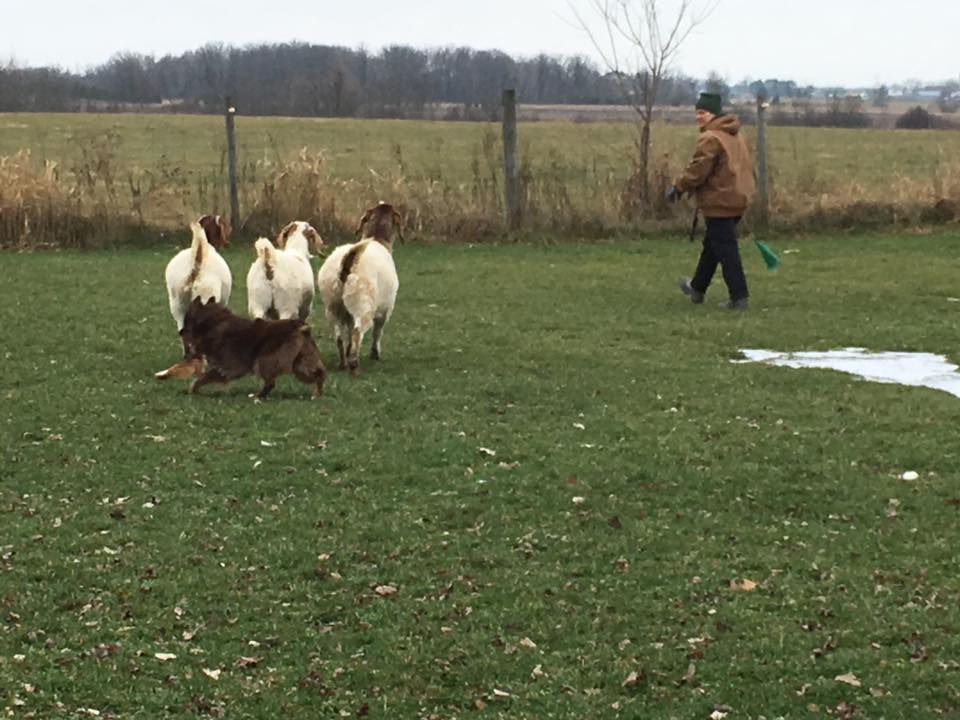
Everything I Needed to Know About Leadership, I Learned From My Dog—The Next Edition
Two weeks ago, I attended a herding “Sheep Camp” with my young dog, Fire. 5 days of 2-a-day training sessions, during which both of us learned many new skills in herding sheep. Herding is probably the dog sport most like leadership because my dog’s job (like your employees) is to do the work (e.g. herd the sheep). My job is to lead her in ways that help her be successful doing the work and to be the kind of leader she actually wants to follow (e.g. guide her to understand what is it I want, understand how she learns, understand what motivates her, help her stay engaged in a hard job, adjust my style at times to be what SHE needs).
So, here are just a couple of things I learned last week that reminded me of critical leadership lessons:
1. We don’t speak the same language with others or even have similar mindsets and that is not always obvious. I don’t speak dog (though I am learning) and Fire doesn’t speak human (though she is learning). The vision in my head about what I wanted from her was clearly different than what her instincts were telling her to do, or what she had the skill to do. While the difference in language and mindset may be obvious in dog training, I know very well the same thing occurs in leadership. You may think because you both speak English and that you have clearly and articulately explained your vision and/or expectations, that you have been heard. Yet, you—and everyone else on the planet—has had the experience that what you think you communicated is not what others heard. And, you often don’t find that out until much later. Luckily, in herding, the feedback loop is a matter of seconds, but then I had to adjust in seconds as well! What I had to do is observe myself more closely, objectively and yes, painfully to assure I am speaking a similar language and expressing myself as I intend. (Oh, and by the way, I was being watched closely by the trainer whose job it was to point out when I was not clear—no pressure there.) I also had to observe Fire more closely to look for early warning signs that things weren’t on the same page. And by the way, sometimes the signs that we aren’t on the same page were not obvious to either of us until the sheep had run off! Likewise, as a leader, you need to consistently observe yourself and observe others—all the while keeping an eye on everything else in your organization. In these situations, it is easy to get frustrated when others don’t do what you want and it’s easy to assume “its them” or that they will eventually catch on. But the secret in being a great dog handler is to understand that YOU often contribute to what your dog does…because you haven’t trained her or because you gave erroneous information (unintentionally of course). The same is true in leadership. You need to be patient with yourself and others.
2. It’s much harder and far more time consuming than I wanted it to be to get better, even though we had good foundational skills. Fire had the basics of herding skills. I have the basics of handling skills. Yet, we both had to unlearn bad habits and learn new ones. To do that, I had to practice a small skill so that I got my part right, then build on it. Then I had to break down what I wanted from her into small, manageable bites, so that she really learned each individual skill. Then, she had to learn to string them together to get the job done. Believe me, we needed way more than a week to do this! In leadership, we underestimate how long it takes for us and other to learn new habits, especially “leadership competencies.” And, we underestimate the intricate and nuanced “micro skills” that are foundational (yet sometimes lacking). For example, a common leadership competency that we all need and want is building and maintaining relationships. That seems pretty foundational, but actually takes a huge number of individual “micro skills” that may have never been learned or have been learned poorly. Additionally, the relationship competencies someone does display typically stem from a strong habit that is mighty hard to break. Leaders have their own habits and others have theirs. If leaders aren’t trying to improve their skills, I guarantee you that your people have noticed and are not impressed if you try to coach them to improve theirs.
Frankly, in this learning process with Fire, I am sometimes amazed she doesn’t just bite me. I frustrate her, I confuse her, yet never for a minute did I intend to do any of those things. It took openness, observation, humility, patience, and a really great coach (!) to make progress. If you are learning to do herding—or leadership—I know some great coaches to help you. Send me an email to learn more.



